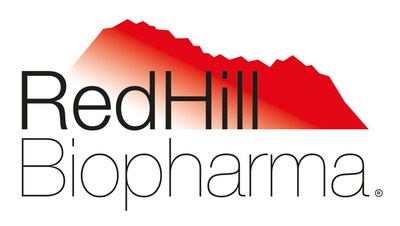RedHill Biopharma Ltd. (Nasdaq: RDHL) (“RedHill” or “the Company”), a specialty biopharmaceutical company, today announced that it has initiated its Phase 3 study to evaluate the safety and efficacy of RHB-204 as a potential first-line, stand-alone, oral treatment of pulmonary nontuberculous mycobacteria (NTM) disease caused by Mycobacterium avium Complex (MAC) – a rare disease for which there is no FDA-approved first-line therapy
| TEL AVIV, Israel and RALEIGH, N.C., Nov. 20, 2020 /PRNewswire/ -- RedHill Biopharma Ltd. (Nasdaq: RDHL) (“RedHill” or “the Company”), a specialty biopharmaceutical company, today announced that it has initiated its Phase 3 study to evaluate the safety and efficacy of RHB-204 as a potential first-line, stand-alone, oral treatment of pulmonary nontuberculous mycobacteria (NTM) disease caused by Mycobacterium avium Complex (MAC) – a rare disease for which there is no FDA-approved first-line therapy. “NTM is a debilitating disease that can cause scarring, fibrosis and the formation of cavities or pits in the lungs, which can lead to potentially fatal respiratory failure. People with existing lung conditions, such as bronchiectasis and those with COPD, are particularly susceptible,” said Prof. Kevin Winthrop, MD, MPH, Professor of Infectious Diseases, Oregon Health & Science University, and study Principal Investigator. “NTM is notoriously resistant to most antibiotics and challenging to treat, and there is no FDA-approved first-line therapy for the approximately 110,000 cases of NTM infection in the U.S. This study of orally-administered RHB-204, if successful, represents an opportunity to make a breakthrough in managing NTM infections.” “Treatment of NTM disease requires multiple antibiotics and an extended treatment course due to the risk of development of resistance1,” said Aida Bibliowicz, RedHill’s Vice President of Clinical Affairs. “Many patients fail these types of therapies and more than half will have either recurring disease or a new infection after completing treatment2, making new treatment options for NTM an urgent need.” The multi-center, randomized, double-blind, two-part, placebo-controlled, parallel-group Phase 3 study will be conducted at up to 40 sites across the U.S. and aims to enroll 125 patients, randomized at a 3:2 ratio to receive either RHB-204 or placebo. The study is designed to evaluate the safety and efficacy of RHB-204 in patients with symptomatic Mycobacterium avium Complex (MAC) lung disease. Study endpoints include sputum culture conversion at month six of treatment with RHB-204, compared to placebo and patient-reported outcomes, including improvements in physical functioning, respiratory symptoms and fatigue. Following this assessment (part one of the study), patients may be eligible to continue double-blinded treatment for up to 16 months (part two). Sustainability of clinical benefit and durability of microbiological response will be assessed at month 16 and again three months after treatment completion. RHB-204 was recently granted Orphan Drug designation, extending U.S. market exclusivity for RHB-204 by an additional seven years, for a potential total of 12 years upon FDA approval. RHB-204 had also previously been granted a Qualified Infectious Disease Product (QIDP) designation by the FDA, providing eligibility for Fast-Track development, NDA Priority Review and a five-year extension of U.S. market exclusivity, if approved. The Phase 3 study of RHB-204 is registered on www.ClinicalTrials.gov, a web-based service by the U.S. National Institute of Health, which provides public access to information on publicly and privately supported clinical studies. About Pulmonary Nontuberculous Mycobacteria (NTM) Disease Pulmonary nontuberculous mycobacteria (NTM) disease is a chronic and debilitating lung disease caused by ubiquitous environmental bacteria found in soil, as well as natural and engineered water systems. The most common NTM symptoms include fever, weight loss, chest pain, and blood in sputum3. Pulmonary NTM disease can lead to recurring cases of bronchitis and pneumonia and can, in some cases, lead to respiratory failure4. Although rare, the incidence and prevalence of pulmonary NTM disease are increasing in many areas of the world5. There were an estimated 110,000 pulmonary NTM disease patients in the U.S. in 20176. Pulmonary manifestations account for 80-90% of all NTM-associated diseases7, and approximately 80% of pulmonary NTM disease are caused by Mycobacterium avium Complex (MAC)8. About RHB-204 RHB-204 is a proprietary, fixed-dose oral capsule containing a combination of clarithromycin, rifabutin, and clofazimine, developed for the treatment of pulmonary NTM disease caused by Mycobacterium avium Complex (MAC). RHB-204 was granted both FDA Orphan Drug designation for the treatment of NTM disease and QIDP Designation under the Generating Antibiotic Incentives Now Act (GAIN Act), extending U.S. market exclusivity for RHB-204 to a potential total of 12 years to be granted at the time of FDA approval. RHB-204 is also covered by U.S. patents which extend patent protection until 2029 and a pending U.S. patent application which, if allowed, could extend RHB-204 patent protection until 2041. About RedHill Biopharma RedHill Biopharma Ltd. (Nasdaq: RDHL) is a specialty biopharmaceutical company primarily focused on gastrointestinal and infectious diseases. RedHill promotes the gastrointestinal drugs, Movantik® for opioid-induced constipation in adults9, Talicia® for the treatment of Helicobacter pylori (H. pylori) infection in adults10, and Aemcolo® for the treatment of travelers’ diarrhea in adults11. RedHill’s key clinical late-stage development programs include: (i) RHB-204, with an ongoing Phase 3 study for pulmonary nontuberculous mycobacteria (NTM) disease; (ii) opaganib (Yeliva®), a first-in-class SK2 selective inhibitor targeting multiple indications with a Phase 2/3 program for COVID-19 and Phase 2 studies for prostate cancer and cholangiocarcinoma ongoing; (iii) RHB-104, with positive results from a first Phase 3 study for Crohn’s disease; (iv) RHB-102 (Bekinda®), with positive results from a Phase 3 study for acute gastroenteritis and gastritis and positive results from a Phase 2 study for IBS-D; (v) RHB-107 (upamostat), a Phase 2-stage serine protease inhibitor with a planned Phase 2/3 study in symptomatic COVID-19 and targeting multiple other cancer and inflammatory gastrointestinal diseases; and (vi) RHB-106, an encapsulated bowel preparation. More information about the Company is available at www.redhillbio.com. This press release contains “forward-looking statements” within the meaning of the Private Securities Litigation Reform Act of 1995. Such statements may be preceded by the words “intends,” “may,” “will,” “plans,” “expects,” “anticipates,” “projects,” “predicts,” “estimates,” “aims,” “believes,” “hopes,” “potential” or similar words. Forward-looking statements are based on certain assumptions and are subject to various known and unknown risks and uncertainties, many of which are beyond the Company’s control and cannot be predicted or quantified, and consequently, actual results may differ materially from those expressed or implied by such forward-looking statements. Such risks and uncertainties include, without limitation; the risk that the Company will not succeed to complete the patient recruitment; the risk that the U.S. Phase 3 clinical study evaluating RHB-204 will not be successful or, if successful, will not suffice for regulatory marketing approval without the need for additional clinical and/or other studies; as well as risks and uncertainties associated with (i) the initiation, timing, progress and results of the Company’s research, manufacturing, pre-clinical studies, clinical trials, and other therapeutic candidate development efforts, and the timing of the commercial launch of its commercial products and ones it may acquire or develop in the future; (ii) the Company’s ability to advance its therapeutic candidates into clinical trials or to successfully complete its pre-clinical studies or clinical trials or the development of a commercial companion diagnostic for the detection of MAP; (iii) the extent and number and type of additional studies that the Company may be required to conduct and the Company’s receipt of regulatory approvals for its therapeutic candidates, and the timing of other regulatory filings, approvals and feedback; (iv) the manufacturing, clinical development, commercialization, and market acceptance of the Company’s therapeutic candidates and Talicia®; (v) the Company’s ability to successfully commercialize and promote Talicia®, and Aemcolo® and Movantik®; (vi) the Company’s ability to establish and maintain corporate collaborations; (vii) the Company’s ability to acquire products approved for marketing in the U.S. that achieve commercial success and build its own marketing and commercialization capabilities; (viii) the interpretation of the properties and characteristics of the Company’s therapeutic candidates and the results obtained with its therapeutic candidates in research, pre-clinical studies or clinical trials; (ix) the implementation of the Company’s business model, strategic plans for its business and therapeutic candidates; (x) the scope of protection the Company is able to establish and maintain for intellectual property rights covering its therapeutic candidates and its ability to operate its business without infringing the intellectual property rights of others; (xi) parties from whom the Company licenses its intellectual property defaulting in their obligations to the Company; (xii) estimates of the Company’s expenses, future revenues, capital requirements and needs for additional financing; (xiii) the effect of patients suffering adverse experiences using investigative drugs under the Company’s Expanded Access Program; (xiv) competition from other companies and technologies within the Company’s industry; and (xv) the hiring and employment commencement date of executive managers. More detailed information about the Company and the risk factors that may affect the realization of forward-looking statements is set forth in the Company’s filings with the Securities and Exchange Commission (SEC), including the Company’s Annual Report on Form 20-F filed with the SEC on March 4, 2020. All forward-looking statements included in this press release are made only as of the date of this press release. The Company assumes no obligation to update any written or oral forward-looking statement, whether as a result of new information, future events or otherwise unless required by law.
SOURCE RedHill Biopharma Ltd. | ||||
Company Codes: NASDAQ-SMALL:RDHL, OTC-PINK:REDIF |





